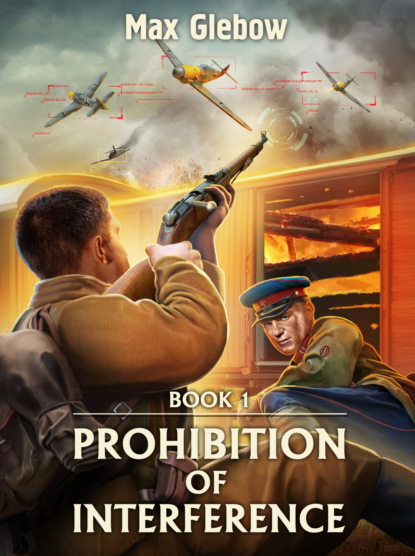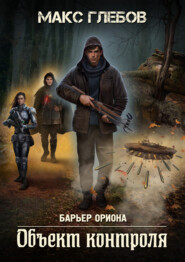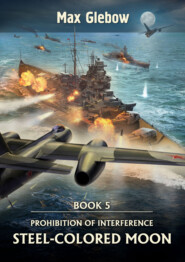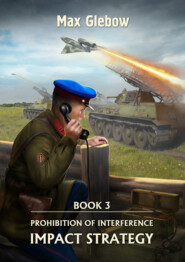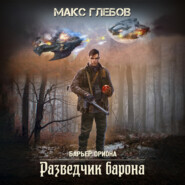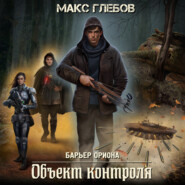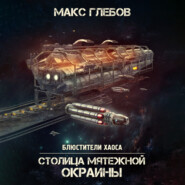По всем вопросам обращайтесь на: info@litportal.ru
(©) 2003-2024.
✖
Prohibition of Interference. Book 1
Настройки чтения
Размер шрифта
Высота строк
Поля
After the fifth push to the shoulder, the magazine was empty. None of the enemy planes exploded in midair or crashed to the ground, but only the leader of the second pair fired a short and kind of tentative burst at the men running toward the woods. The rest of the planes came out of the attack without firing their machine guns. A not too thick, but clearly visible dark plume stretched behind the two Messerschmitts. All four German fighters turned smoothly to the west and quickly disappeared behind the forest.
I cancelled the combat mode of the implants, put the rifle next to its dead owner and sank tiredly to the ground. The surviving soldiers were returning from the edge of the forest to the burning train. Some helped the wounded walk, while others waddled with difficulty. I felt a stare on me and turned around. A senior lieutenant of the NKVD, commander of the security platoon of our defeated train, was looking at me silently and very attentively from the neighboring car.
Chapter 4
We spent the rest of the day helping the wounded and burying the dead. We had no means of communication, and even if we had any, it was burned up in the bombed-out cars.
There was no movement on the railroad either from Uman or from the rear, but several times German bombers and fighter planes flew close to us. We heard explosions and the rumble of artillery cannonade. The situation on the front continued to deteriorate rapidly.
We had no means of transporting the wounded. Stretchers made from cape-tents and poles cut out in the nearby woods made things a little easier, but all the same our marching unit looked like a walking hospital. There were no medics among us, so there was nothing we could do to help the wounded except for primitive bandaging.
The NKVD platoon commander, with 12 men left, tried to hold on, but the defeat of the train was an unbearable burden on him. The First Lieutenant seemed to think that he was responsible for everything that had happened.
“Comrades Red Army men, if anyone else does not know, I’m First Lieutenant Fyodorov. I am assigned to accompany your military echelon, which means I am your commander. And if that's the case, everybody listen to the battle order!” he said it in a hoarse voice as he strode in front of our uneven line, “We are now moving in a marching column to the west along the railroad tracks. We'll take turns carrying the wounded. It's evening, but we can't stay here overnight – they're waiting for us in Uman. That's where you should all get your weapons and assignments to your units. We'll walk all night if we have to. Any questions?”
I was about to ask why we, unarmed and with wounded in our arms, should go into the trap into which the outskirts of Uman were turning, but after looking into the eyes of the First lieutenant, I changed my mind. People here thought in very different terms, and no amount of reasoning could shake this officer's determination to follow orders and get us to our prescribed destination. Besides, the First Lieutenant didn't know what was really going on around us right now, and I couldn't plausibly explain to him how I knew it.
Nevertheless, our temporary commander noticed something on my face. After the fight was over, he looked in my direction regularly, but he never asked me anything until then.
“Soldier, do you have a question?” The First Lieutenant turned his whole body toward me.
“Red Armyman Nagulin,” I introduced myself and took a step out of the ranks, “Comrade First Lieutenant, we are going to the front. The situation is not quite clear, but from the looks of it, it has deteriorated a lot in recent hours. We have the rifles of your dead fighters and the machine gun platform crew. Right now your people are carrying them, but maybe it makes sense to distribute these weapons to us?”
“If we have to, we will,” the First Lieutenant answered sharply, without explaining anything, “Get the stretchers up with the wounded! We're moving out.”
“Comrade First Lieutenant…”
“Follow your orders, soldier. Or should I repeat it?” The First Lieutenant squinted unkindly, and behind his shoulder a sergeant in NKVD uniform reached for his weapon.
Well, if I have to do it, I'll do it.
“Copy that,” I answered clearly, devouring the boss with my eyes, for I had absolutely no desire to see what would happen next if I began to insist.
“That's better,” the First Lieutenant mumbled in a completely hoarse voice and went in a wide stride toward the head of the column that had begun to move. The Sergeant looked at me unkindly for a while, but then turned around and ran after the commander.
Army discipline, especially in a combat situation, is undoubtedly a wonderful thing, but I had absolutely no intention of continuing to beg for a rifle from the commander. I just wanted to tell him that walking along the railroad tracks in the direction of the train to get to Uman is a futile matter. If we do that, after 40 kilometers, which is a lot for our column, we will be at the Khristinovka station. Only from there there is a branch to Uman, which goes almost in the opposite direction, to the southeast. Uman itself is now about 25 kilometers south of us, and if you go there, it is better to go straight through fields and woods, rather than along the railroad, which not only greatly lengthens the way, but also attracts the German air force like a magnet. The latter, of course, is not so scary right now, since it's already getting dark, and enemy planes won't appear over us until morning, but the fact that once we get to Khristinovka we will still find our troops there, and not the Germans, is highly doubtful.
“Well, Pyotr, have you got it?” I didn't notice Boris next to me as I pondered, “You talk a lot, and in all the wrong places. I also like to talk, but I always know where to do it and where not to do it. This is the NKVD, you have to understand. And you started discussing orders, and in a combat situation. Did you see how that sergeant was groping the rifle? No doubt he would have fired without hesitation, at one movement of the commander's eyebrow.”
“I don't doubt it,” I didn't argue, “I could see it in his face.”
“You've gone completely feral in your taiga, I see. Stick with me, or you'll get in trouble. Be thankful that nobody whispered to the First Lieutenant or his Sergeant about how you left the wagon without permission… Apparently, they've forgotten this episode out of fear. But now it seems calmer, so maybe someone will remember, if those who saw it are alive, of course.”
“It won't be for long,” I answered softly, and immediately regretted what I had said.
“What won't be for long? Have they forgotten that not for long? That's what I'm telling you.”
“No. That's not what I mean, I mean it's calmer now, but it'll be over soon.”
“What's going to be over?”
“The silence, if you can call it that. Do you have any idea where we're going?”
“Well, to Uman, the commander told you directly.”
“We're not going to Uman! Uman is over there!” I waved my hand to the south, perpendicular to the direction of our movement, “And these tracks lead to the Khristinovka station, which is 20 kilometers west of Uman. There will be a front line there any day now, or even by tomorrow morning! Do you hear that rumbling?”
“Does the commander know less than you?” There was a suspicious mistrust in Boris's voice, “He's got a map, too! Well, he should. And how do you know where Uman is? And about Khristinovka?”
“You just had to study well in school, Boris, not dream about girls in class. My father taught me – there was no school in the taiga. You live in the great country of victorious socialism, and you should know the geography of your immense motherland. Did you remember the names of the stations we passed?”
“Well…” Boris said in a lower tone, obviously not expecting such a rebuke from me, “it seems that we passed through Talnoye… And Yurkovka.”
“Do you have any idea where we are?”
“Not really, I'm from Voronezh…”
“Have you never seen a map of the USSR either? It's only 700 kilometers from here to your Voronezh, by the way. You can get there on foot.”
“Look, Pyotr, why are you picking on me? I realized that you know geography well.”
“Well, if you understand it, then there's no need to ask stupid questions. Let's better think about how to report to the commander that this railroad won't lead us to Uman.”
“It's no use,” Boris shook his head, “He won't listen to you, and he won't listen to me either. What are you suggesting? To turn into the fields and go straight ahead? But you can lose your way easily, as there are no landmarks. And the rails are right there, you can't get lost.”
“I'll show us out,” I said without proper confidence. I understood that, but I really didn't want to go where the First Lieutenant was leading us.
“Listen to me, Pyotr…” I could hardly make out Boris's grin in the darkness, “Do you believe yourself? At night, without a road, with the wounded in our arms, in unfamiliar terrain… It's not like you can drive your finger on a map of your home country in the warmth and comfort of your own home. No offense, but it's all nonsense. After all, we have an order, and it has to be obeyed.”
Then we walked in silence, gradually getting into the rhythm, and about 30 minutes later it was our turn to carry the wounded, and there was no time to talk.
* * *
No matter how hard the First Lieutenant tried to move quickly, but we still had to make three stops. The men were too exhausted for the day, and they were simply unable to endure the continuous march through the night while carrying the wounded. After the defeat of the echelon there were about 150 of us left. There were 27 wounded on stretchers, but by morning six of them had died, yet our losses did not end there. Apparently, I was not the only one who did not like the idea of walking blindly and unarmed toward the advancing Germans, and the fact that the front line was not far away could only be doubted by a deaf person.
At the last resting place just before dawn, the sergeant conducted a roll call on the orders of the commander. Our unit was 17 men short. I was beginning to understand why the First Lieutenant was so sour about my suggestion to give us the rifles of dead soldiers.
The morning greeted us unpleasantly. The indistinct roar that had sounded all night in the west had turned into a continuous rumble, in which individual violent explosions were already clearly distinguishable. But the worst thing was that it was now heard not only from the west, but also from the north and even from the northeast. It finally dawned on the First Lieutenant, too, that something wasn't going quite the way he wanted it to, despite all his unwavering determination to follow orders.
“Soldiers!” He looked at us with a frown, “Anybody here from these parts?”
The answer to the commander was silence. We were all mobilized in the eastern regions of the country. Boris, with his Voronezh, was probably the most western of us, so we couldn't please the First Lieutenant in any way. Well, almost.
“Red Army man Nagulin!” I went out of the line.
“You again?” The First Lieutenant's voice had a bad tone to it, “Are you from around here?”
“No, Comrade First Lieutenant. But I can draw a schematic map and roughly show you where we are.”
I cancelled the combat mode of the implants, put the rifle next to its dead owner and sank tiredly to the ground. The surviving soldiers were returning from the edge of the forest to the burning train. Some helped the wounded walk, while others waddled with difficulty. I felt a stare on me and turned around. A senior lieutenant of the NKVD, commander of the security platoon of our defeated train, was looking at me silently and very attentively from the neighboring car.
Chapter 4
We spent the rest of the day helping the wounded and burying the dead. We had no means of communication, and even if we had any, it was burned up in the bombed-out cars.
There was no movement on the railroad either from Uman or from the rear, but several times German bombers and fighter planes flew close to us. We heard explosions and the rumble of artillery cannonade. The situation on the front continued to deteriorate rapidly.
We had no means of transporting the wounded. Stretchers made from cape-tents and poles cut out in the nearby woods made things a little easier, but all the same our marching unit looked like a walking hospital. There were no medics among us, so there was nothing we could do to help the wounded except for primitive bandaging.
The NKVD platoon commander, with 12 men left, tried to hold on, but the defeat of the train was an unbearable burden on him. The First Lieutenant seemed to think that he was responsible for everything that had happened.
“Comrades Red Army men, if anyone else does not know, I’m First Lieutenant Fyodorov. I am assigned to accompany your military echelon, which means I am your commander. And if that's the case, everybody listen to the battle order!” he said it in a hoarse voice as he strode in front of our uneven line, “We are now moving in a marching column to the west along the railroad tracks. We'll take turns carrying the wounded. It's evening, but we can't stay here overnight – they're waiting for us in Uman. That's where you should all get your weapons and assignments to your units. We'll walk all night if we have to. Any questions?”
I was about to ask why we, unarmed and with wounded in our arms, should go into the trap into which the outskirts of Uman were turning, but after looking into the eyes of the First lieutenant, I changed my mind. People here thought in very different terms, and no amount of reasoning could shake this officer's determination to follow orders and get us to our prescribed destination. Besides, the First Lieutenant didn't know what was really going on around us right now, and I couldn't plausibly explain to him how I knew it.
Nevertheless, our temporary commander noticed something on my face. After the fight was over, he looked in my direction regularly, but he never asked me anything until then.
“Soldier, do you have a question?” The First Lieutenant turned his whole body toward me.
“Red Armyman Nagulin,” I introduced myself and took a step out of the ranks, “Comrade First Lieutenant, we are going to the front. The situation is not quite clear, but from the looks of it, it has deteriorated a lot in recent hours. We have the rifles of your dead fighters and the machine gun platform crew. Right now your people are carrying them, but maybe it makes sense to distribute these weapons to us?”
“If we have to, we will,” the First Lieutenant answered sharply, without explaining anything, “Get the stretchers up with the wounded! We're moving out.”
“Comrade First Lieutenant…”
“Follow your orders, soldier. Or should I repeat it?” The First Lieutenant squinted unkindly, and behind his shoulder a sergeant in NKVD uniform reached for his weapon.
Well, if I have to do it, I'll do it.
“Copy that,” I answered clearly, devouring the boss with my eyes, for I had absolutely no desire to see what would happen next if I began to insist.
“That's better,” the First Lieutenant mumbled in a completely hoarse voice and went in a wide stride toward the head of the column that had begun to move. The Sergeant looked at me unkindly for a while, but then turned around and ran after the commander.
Army discipline, especially in a combat situation, is undoubtedly a wonderful thing, but I had absolutely no intention of continuing to beg for a rifle from the commander. I just wanted to tell him that walking along the railroad tracks in the direction of the train to get to Uman is a futile matter. If we do that, after 40 kilometers, which is a lot for our column, we will be at the Khristinovka station. Only from there there is a branch to Uman, which goes almost in the opposite direction, to the southeast. Uman itself is now about 25 kilometers south of us, and if you go there, it is better to go straight through fields and woods, rather than along the railroad, which not only greatly lengthens the way, but also attracts the German air force like a magnet. The latter, of course, is not so scary right now, since it's already getting dark, and enemy planes won't appear over us until morning, but the fact that once we get to Khristinovka we will still find our troops there, and not the Germans, is highly doubtful.
“Well, Pyotr, have you got it?” I didn't notice Boris next to me as I pondered, “You talk a lot, and in all the wrong places. I also like to talk, but I always know where to do it and where not to do it. This is the NKVD, you have to understand. And you started discussing orders, and in a combat situation. Did you see how that sergeant was groping the rifle? No doubt he would have fired without hesitation, at one movement of the commander's eyebrow.”
“I don't doubt it,” I didn't argue, “I could see it in his face.”
“You've gone completely feral in your taiga, I see. Stick with me, or you'll get in trouble. Be thankful that nobody whispered to the First Lieutenant or his Sergeant about how you left the wagon without permission… Apparently, they've forgotten this episode out of fear. But now it seems calmer, so maybe someone will remember, if those who saw it are alive, of course.”
“It won't be for long,” I answered softly, and immediately regretted what I had said.
“What won't be for long? Have they forgotten that not for long? That's what I'm telling you.”
“No. That's not what I mean, I mean it's calmer now, but it'll be over soon.”
“What's going to be over?”
“The silence, if you can call it that. Do you have any idea where we're going?”
“Well, to Uman, the commander told you directly.”
“We're not going to Uman! Uman is over there!” I waved my hand to the south, perpendicular to the direction of our movement, “And these tracks lead to the Khristinovka station, which is 20 kilometers west of Uman. There will be a front line there any day now, or even by tomorrow morning! Do you hear that rumbling?”
“Does the commander know less than you?” There was a suspicious mistrust in Boris's voice, “He's got a map, too! Well, he should. And how do you know where Uman is? And about Khristinovka?”
“You just had to study well in school, Boris, not dream about girls in class. My father taught me – there was no school in the taiga. You live in the great country of victorious socialism, and you should know the geography of your immense motherland. Did you remember the names of the stations we passed?”
“Well…” Boris said in a lower tone, obviously not expecting such a rebuke from me, “it seems that we passed through Talnoye… And Yurkovka.”
“Do you have any idea where we are?”
“Not really, I'm from Voronezh…”
“Have you never seen a map of the USSR either? It's only 700 kilometers from here to your Voronezh, by the way. You can get there on foot.”
“Look, Pyotr, why are you picking on me? I realized that you know geography well.”
“Well, if you understand it, then there's no need to ask stupid questions. Let's better think about how to report to the commander that this railroad won't lead us to Uman.”
“It's no use,” Boris shook his head, “He won't listen to you, and he won't listen to me either. What are you suggesting? To turn into the fields and go straight ahead? But you can lose your way easily, as there are no landmarks. And the rails are right there, you can't get lost.”
“I'll show us out,” I said without proper confidence. I understood that, but I really didn't want to go where the First Lieutenant was leading us.
“Listen to me, Pyotr…” I could hardly make out Boris's grin in the darkness, “Do you believe yourself? At night, without a road, with the wounded in our arms, in unfamiliar terrain… It's not like you can drive your finger on a map of your home country in the warmth and comfort of your own home. No offense, but it's all nonsense. After all, we have an order, and it has to be obeyed.”
Then we walked in silence, gradually getting into the rhythm, and about 30 minutes later it was our turn to carry the wounded, and there was no time to talk.
* * *
No matter how hard the First Lieutenant tried to move quickly, but we still had to make three stops. The men were too exhausted for the day, and they were simply unable to endure the continuous march through the night while carrying the wounded. After the defeat of the echelon there were about 150 of us left. There were 27 wounded on stretchers, but by morning six of them had died, yet our losses did not end there. Apparently, I was not the only one who did not like the idea of walking blindly and unarmed toward the advancing Germans, and the fact that the front line was not far away could only be doubted by a deaf person.
At the last resting place just before dawn, the sergeant conducted a roll call on the orders of the commander. Our unit was 17 men short. I was beginning to understand why the First Lieutenant was so sour about my suggestion to give us the rifles of dead soldiers.
The morning greeted us unpleasantly. The indistinct roar that had sounded all night in the west had turned into a continuous rumble, in which individual violent explosions were already clearly distinguishable. But the worst thing was that it was now heard not only from the west, but also from the north and even from the northeast. It finally dawned on the First Lieutenant, too, that something wasn't going quite the way he wanted it to, despite all his unwavering determination to follow orders.
“Soldiers!” He looked at us with a frown, “Anybody here from these parts?”
The answer to the commander was silence. We were all mobilized in the eastern regions of the country. Boris, with his Voronezh, was probably the most western of us, so we couldn't please the First Lieutenant in any way. Well, almost.
“Red Army man Nagulin!” I went out of the line.
“You again?” The First Lieutenant's voice had a bad tone to it, “Are you from around here?”
“No, Comrade First Lieutenant. But I can draw a schematic map and roughly show you where we are.”





